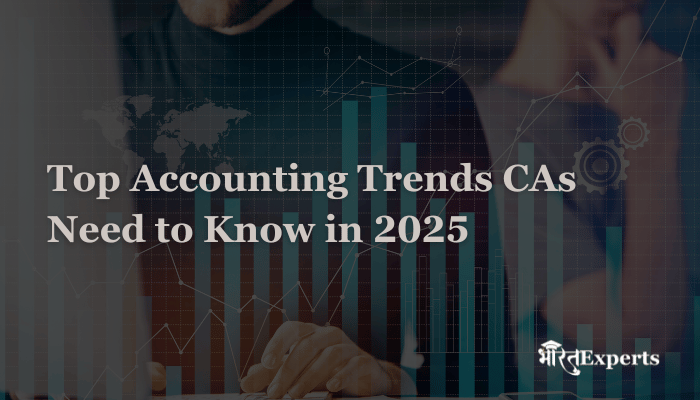The world of accounting is undergoing profound changes as technology advances, regulations consolidate, and customer service guides the future of Chartered Accountants (CAs). As 2025 arrives, these accountants need to stay up-to-date with major, uncertain accounting trends that will affect them. Accounting trends not only ensure compliance but also present opportunities to cut costs, improve client service, and remain competitive in a changing market.
This article will cover the major accounting trends for CAs to focus on in 2025.
1. AI and Automation in Accounting Practices
Artificial Intelligence (AI) is transforming accounting by automating tedious tasks, improving precision, and providing insights for financial decision-making.
- AI can automate tasks such as data entry, paper bill management, and refund management.
- Predictive analytics and machine learning help forecast future financial trends and identify potential risks.
- Robotic Process Automation (RPA) helps automate data entry and posting figures, speeding up processes and reducing mistakes.
What CAs Can Do:
✅ Incorporate AI-enabled accounting tools to handle repetitive work.
✅ Use predictive analytics to forecast future financial trends and add value for clients.
2. Data Security for On-the-Go Accounting Services
Cloud technology continues to revolutionize the way CAs manage clients’ accounts by offering real-time access to financial data.
- Cloud-based accounting tools like QuickBooks, Xero, and Zoho Books allow for remote collaboration and continuous updates to ensure accuracy.
- Cloud-based systems enhance security and data storage, but they require proper administration to avoid risks.
What CAs Can Do:
✅ Migrate to cloud accounting solutions, offering clients real-time access to account information.
✅ Inform clients about the benefits of cloud-based accounting to improve financial management and data protection.
3. Preparing for Data Privacy Regulations and Cybersecurity
With the increasing number of cyber threats and data breaches, data privacy and cybersecurity are vital issues. Data protection laws like GDPR and India’s Personal Data Protection Bill will influence how CAs handle client data.
- Clients and accounting firms are under scrutiny regarding how they manage customer data.
- CAs must adopt secure systems to prevent cyberattacks and ensure compliance with regulations.
What CAs Should Do:
✅ Abide by data protection laws and implement cybersecurity measures to protect client information.
✅ Inform clients about best practices for data privacy and how to securely preserve their information.
4. The Growth of ESG (Environmental, Social, and Governance) Accounting
Environmental, Social, and Governance (ESG) considerations are transforming businesses, and accounting is no exception. Investors, clients, and regulators want more transparency about how companies manage their ESG efforts.
- Companies are required to report not only their financial performance but also their impact on the environment, social responsibility, and corporate governance.
What CAs Should Do:
✅ Stay updated with ESG legislation and help clients establish ESG policies.
✅ Assist clients in reporting the financial impacts of ESG actions and aligning their corporate strategies with global sustainability norms.
5. Blockchain Technology and Cryptocurrency
Blockchain and cryptocurrency are breaking apart traditional financial systems, creating new opportunities for digital asset management and secure transactions.
- Blockchain technology provides transparency and security for financial transactions.
- Cryptocurrency presents both a challenge and an opportunity for accountants to manage and report digital assets.
What CAs Should Do:
✅ Stay informed about cryptocurrency regulations and help clients comply with crypto tax laws.
✅ Learn how to manage and audit cryptocurrency assets and guide clients through blockchain-based transactions.
6. Automation of Tax Filing and Compliance
The automation of tax filing is revolutionizing the accounting industry. Cloud-based tools and automated software allow CAs to provide faster and more accurate tax returns and reports.
- Tax automation tools handle complex calculations, update tax rates, and track law changes.
- Automation reduces errors, especially in GST compliance, income tax returns, and corporate tax filings.
What CAs Should Do:
✅ Install tax automation software to streamline tax filings and increase efficiency.
✅ Stay updated with new tax reform rules and compliance regulations that affect tax returns.
7. The Increasing Role of Forensic Accounting
As fraud and financial wrongdoing increase, the demand for forensic accounting services is growing. CAs will be required to investigate financial crimes, identify fraud, and support litigation.
- Forensic accountants will be tasked with detecting discrepancies, conducting audits, and strengthening internal controls to prevent fraud.
What CAs Should Do:
✅ Specialize in forensic accounting and offer fraud detection services.
✅ Provide audit services to help businesses manage financial risks.
8. Remote Work and Virtual Accounting Firms
The shift to remote work, driven by COVID-19, will continue for at least the next five years. Virtual accounting firms and remote services will become more common in 2025.
- Remote accounting allows CAs to serve clients from anywhere, reducing overhead and increasing efficiency.
- Cloud-based platforms and secure communication tools are essential for remote services while maintaining confidentiality.
What CAs Should Do:
✅ Adopt remote accounting tools and secure communication platforms to offer efficient services.
✅ Embrace the virtual accounting model to serve clients seamlessly.




